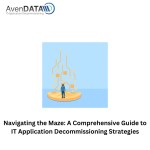As organizations evolve and technology advances, the need to decommission legacy systems like Oracle becomes increasingly clear. Decommissioning an Oracle system, while initially daunting, can yield significant cost savings and a compelling return on investment. This blog delves into the financial benefits and ROI associated with Oracle decommissioning, providing a detailed analysis of how businesses can effectively manage and capitalize on this transition.
Understanding the Financial Impact of Oracle Decommissioning
Decommissioning an Oracle system involves various upfront costs, including project planning, data migration, system integration, and compliance measures. However, the potential savings often outweigh these initial investments. Here’s how decommissioning Oracle systems can lead to substantial cost savings and ROI:
Reduction in Maintenance Costs
Maintaining legacy Oracle systems can be costly. Expenses include hardware upkeep, software licensing fees, and ongoing support. By decommissioning outdated systems, organizations can eliminate these recurring expenses. Modern alternatives, whether on-premises or cloud-based, generally come with lower maintenance costs due to improved efficiency and vendor support.
Lower Energy Consumption
Legacy systems typically consume more energy compared to modern alternatives. Decommissioning these systems can lead to substantial savings on energy bills. Newer systems are designed with energy efficiency in mind, offering better performance with lower power consumption.
Improved Resource Allocation
Decommissioning Oracle systems frees up IT resources, allowing them to focus on more strategic initiatives. This shift can lead to enhanced productivity and innovation, driving further business value.
Reduced Risk of Downtime and Data Breaches
Older systems are more prone to failures and cyber-attacks, which can be costly in terms of both money and reputation. By transitioning to more secure and reliable systems, businesses can minimize these risks.
Conclusion
Oracle decommissioning presents a strategic opportunity for organizations to reduce costs, enhance operational efficiency, and achieve a robust ROI. By carefully planning and executing the decommissioning process, businesses can unlock significant financial benefits while positioning themselves for future growth and innovation. As organizations increasingly prioritize cost-efficiency and sustainability, Oracle decommissioning stands out as a critical component of modern IT strategy.





.jpg)
Comments